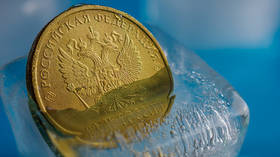EU makes decision on frozen Russian funds

The European Union on Monday took a step towards confiscating the interest earned by Russian sovereign funds the bloc has frozen in response to the Ukraine conflict.
The EU and the US moved to freeze an estimated $300 billion in assets belonging to the Russian Central Bank, most of which are held by the Brussels-based clearinghouse Euroclear, in February 2022.
On Monday, the European Council ordered all depositors holding €1 million ($1.08 million) or more in Russian Central Bank assets to keep separate accounts of “extraordinary cash balances accumulating due to EU restrictive measures” and prohibited them from disposing of any interest or profits from the frozen assets.
“This decision paves the way for the Council to decide on a possible establishment of a financial contribution to the EU budget raised on these net profits to support Ukraine and its recovery and reconstruction at a later stage,” the Council said in a statement.
Moscow has protested the US and EU sanctions as illegal, adding that any attempt to outright seize the Russian funds would be declared theft and receive a response in kind. Russian bankers have also warned that such a step would destroy the confidence of the rest of the world in the rule of law in the West and trigger a run on European and US banks because they would no longer be considered safe.
While the US has been the most outspoken advocate of confiscating the frozen funds to send to Ukraine, the EU stands to lose the most from Moscow’s potential retaliation against such a step. Euroclear alone accounts for €196.6 billion ($211 billion) in frozen Russian assets, and it has accrued nearly €4.4 billion in interest over the past year.
The EU’s “invention of openly fraudulent schemes for the seizure of income from Russian assets is dictated by the need to create the illusion of legitimacy over attacks on our property and thereby camouflage what is in fact an outright theft,” the Russian Foreign Ministry said over the weekend, responding to reports that Brussels would move to seize the interest.
Some EU members have likewise been skeptical of the confiscation proposal. Hungarian Foreign Minister Peter Szijjarto said last week that it sounded uncomfortably like “communist heritage.”












